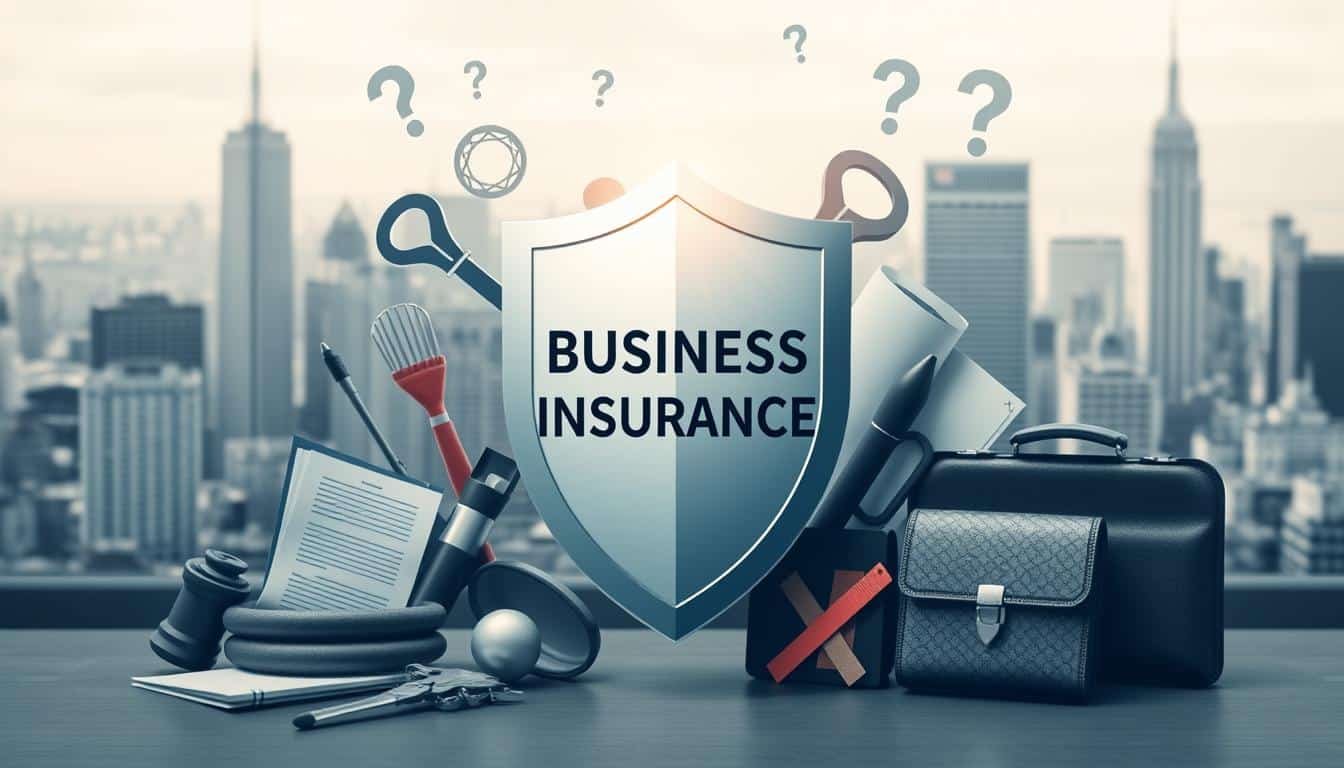Starting a business is exciting, but dealing with legal and insurance rules can be tough. Many entrepreneurs wonder if they can get business insurance without a license.
This article looks into the options and strategies for insuring your business, even if it’s not fully licensed yet.
Key Takeaways
- It is possible to get business insurance without a formal business license, but there are important considerations to keep in mind.
- Liability coverage is often the most crucial type of insurance for unlicensed businesses, protecting against potential lawsuits and claims.
- Small business owners and entrepreneurs should carefully assess their unique risks and implement proactive risk management strategies.
- While insurance can provide valuable protection, it’s important to also ensure compliance with local and state legal requirements for operating a business.
- Tailoring your insurance solutions to your specific needs and risks can help you navigate the complexities of insuring an unlicensed venture.
Decoding the Importance of Business Insurance
Starting a business comes with risks. The right business insurance requirements are key to keeping your finances safe. It covers everything from liability to property protection, helping you through the ups and downs of business.
Understanding the Risks of Operating a Business
Businesses face many risks, including:
- Liability claims from injuries or property damage
- Natural disasters or unexpected events that harm your assets
- Disruptions that can hurt your income and cash flow
- Cyber attacks and data breaches that risk your information
Knowing these risks is the first step to a good risk management for startups plan.
Also Read: Sliding in Insurance: Risks & Tips | Stay Protected.
Types of Business Insurance to Consider
To tackle these risks, consider various liability coverage and small business insurance options, such as:
- General Liability Insurance: Covers claims of bodily injury, property damage, and personal/advertising injury.
- Property Insurance: Helps repair or replace your business’s physical assets if damaged or stolen.
- Business Interruption Insurance: Offers financial help to recover from events that stop your operations.
- Professional Liability Insurance: Protects against claims of negligence or errors in your services.
- Cyber Liability Insurance: Reduces the financial loss from data breaches, cyber attacks, and digital threats.
By knowing the risks and finding the right business insurance requirements, you can protect your company’s future.
“Investing in the right business insurance is one of the smartest decisions an entrepreneur can make. It provides a safety net that allows you to focus on growing your company with confidence.”
Navigating the Legal Requirements for Business Licenses
Before we dive into legally insuring a business, let’s talk about business licenses. In the United States, most places require businesses to have the right licenses and permits. If you don’t get these, you could face big fines and legal trouble for operating without a license.
To make sure your business is legal, you need to check the licensing rules in your area. You might need to register your business, get a general license, and more. The rules can change a lot, so it’s key to look into them carefully.
- Research your state and local licensing requirements
- Register your business with the appropriate authorities
- Obtain a general business license
- Secure any industry-specific permits or licenses
Knowing and following the rules for business licenses is a big step. It helps you legally insure a business and avoid risks of operating without a license. This solid base will support your business as it grows and ensures it follows the law.
“Proper licensing is essential for the long-term success and stability of any business. It’s a crucial step in the journey to operating a legally compliant and insured venture.”
Can You Get Business Insurance Without a Business License?
Yes, you can get business insurance without a license. While getting a formal business license is usually a good idea, it’s not always necessary. You can still get business insurance for unlicensed businesses. But, the coverage might not be as wide as it is for licensed businesses.
Insurance companies see unlicensed businesses as riskier. So, they might ask for more information or offer simpler policies. This means you’ll need to work harder with insurance agents to find the right policy for you.
It’s important to research well and talk to experienced insurance agents. They can help you understand any limits or exclusions for your unlicensed business. By being proactive, you can still protect your business, even without a license.
| Factors to Consider | Implications for Unlicensed Businesses |
|---|---|
| Underwriting Criteria | Insurance providers may have stricter guidelines and risk assessments for unlicensed businesses. |
| Policy Scope and Limits | Coverage options may be more limited, focusing on basic liability protection rather than comprehensive business protection. |
| Premium Costs | Premiums for unlicensed businesses may be higher due to the perceived increased risk. |
Getting business insurance without a license is doable. But, it’s crucial to work with insurance experts to overcome the challenges. They can help you find the right coverage for your business.
Exploring the Options for Insuring Unlicensed Businesses
For entrepreneurs with unlicensed businesses, finding the right insurance is key. The process might be more complex, but there are many options to protect your business. The Liability coverage is especially important for unlicensed businesses.
Liability Coverage for Unlicensed Ventures
Liability insurance helps protect your business from financial losses due to claims or lawsuits. It covers costs like legal fees, settlements, and judgments. Even without a license, this insurance can be a lifesaver.
When looking at liability coverage, think about your business’s specific risks and how much protection you need. Consider the type of work you do, the chance of accidents, and the value of your assets. These factors will help you choose the right coverage.
| Coverage Type | Description | Importance for Unlicensed Businesses |
|---|---|---|
| General Liability Insurance | Covers third-party injuries, property damage, and other claims related to your business operations. | Essential for protecting your unlicensed business from financial liability in the event of accidents or incidents. |
| Professional Liability Insurance | Protects your business from claims of negligence, errors, or omissions in the services you provide. | Crucial for unlicensed professionals, such as consultants or freelancers, to safeguard their work and reputation. |
| Product Liability Insurance | Covers claims related to injuries or damages caused by products your business sells or manufactures. | Vital for unlicensed businesses involved in the production, distribution, or sale of products. |
By understanding your insurance needs and getting the right liability coverage, you can protect your unlicensed business. This ensures it can keep growing and thriving.
Small Business Insurance Considerations
Entrepreneurs and startups, even without a license, need special insurance. The type of business, number of workers, and how you operate are key. These factors decide what insurance you should get.
Looking for insurance for your unlicensed business? Don’t settle for generic policies. Instead, find ones made for small and startup businesses. These are more flexible and fit your needs better.
Tailoring Your Coverage
To make sure your small business insurance covers your unlicensed ventures, think about these important points:
- Industry-specific risks: Know the risks in your field. Look for insurance that covers these, like professional or product liability.
- Number of employees: If you have workers, even part-time or contract, you might need workers’ comp and liability insurance for hiring.
- Business operations: Think about what you do and what could go wrong. Find policies that protect against property damage, business stoppages, or cyber attacks.
Customizing your insurance to fit your business is key. This way, your small business is well-protected, no matter your license status.
| Insurance Coverage | Relevance for Unlicensed Businesses |
|---|---|
| General Liability Insurance | Protects against third-party claims of bodily injury, property damage, and advertising injuries, regardless of licensing status. |
| Professional Liability Insurance | Covers claims of negligence, errors, or omissions in the services you provide, which can be crucial for unlicensed professionals. |
| Property Insurance | Safeguards your business assets, such as equipment, inventory, and physical workspace, even if you don’t have a formal license. |
By thinking about your small business insurance needs and customizing your coverage, you can protect your unlicensed ventures. This helps reduce risks, no matter your license status.
Risk Management Strategies for Startups and Entrepreneurs
Starting a business is exciting, but it comes with risks. Even without a license, you can still manage these risks. A good risk management plan helps protect your business and makes getting insurance easier.
Assessing Your Business’s Unique Risks
Start by figuring out what risks your business faces. This could be anything from lawsuits to property damage. Look closely at your business model and the industry you’re in to understand these risks.
Implementing Proactive Risk Mitigation Measures
After identifying risks, it’s time to act. Here are some steps to take:
- Make safety plans to avoid accidents.
- Use strong cybersecurity to protect your data.
- Have backup plans for when things go wrong.
- Keep updating your risk management plan as your business grows.
By being proactive in risk management for startups, you protect your entrepreneur insurance needs. This shows you’re serious about protecting unlicensed ventures. It can also help you stand out and make it easier to deal with legal and insurance issues as you grow.
“The best way to manage risk is to anticipate it and prepare for it. By being proactive, you can protect your business and ensure its long-term success.”
Legally Insuring Your Business: Compliance Matters
Compliance is crucial when legally insuring your business. You might get insurance without a license, but it’s important to follow local and state laws. Not following these rules can lead to fines, legal trouble, or denied insurance claims.
Working with insurance pros and legal experts is key. They can guide you through the compliance process. They’ll help you understand the licensing needs in your area and plan for growth.
- Identify Local and State Licensing Requirements: Look up the laws in your area. You can find this info on your state or local government websites.
- Obtain the Necessary Licenses and Permits: After finding out what you need, get those licenses and permits. This might include registering your business and getting a tax ID number.
- Consult with Insurance Professionals: Talk to insurance agents who know your industry. They can help you find the right insurance and make sure it follows local rules.
- Maintain Continuous Compliance: Keep checking your business and insurance to make sure you’re still following the rules. You might need to renew licenses or change your insurance.
By focusing on compliance, you can protect your business and avoid legal issues. This way, you can ensure your business is safe and legal, even without all the licenses and permits.
| Compliance Requirement | Description | Potential Consequences |
|---|---|---|
| Business License | Get the business license(s) your local or state government requires. | Fines, legal action, can’t get insurance |
| Permits and Registrations | Get any special permits or registrations, like a sales tax permit. | Fines, legal action, can’t operate legally |
| Insurance Coverage | Make sure your insurance meets local and state laws. | Denied claims, legal liability, fines |
Getting your business legally insured might take more than just getting insurance. By focusing on compliance, you can protect your business and future. This ensures a safe and successful path ahead.
Also Read: Understanding Insurance Endorsement Benefits 2024
Protecting Your Unlicensed Venture: A Comprehensive Approach
Getting insurance for an unlicensed business is a delicate task. You need to find the right coverage while following local laws. Even without a license, you can get some insurance. But, getting the right licenses and permits is key. It helps you follow the law and opens up more insurance options.
Balancing Insurance and Legal Requirements
Running an unlicensed business means you must protect it and follow the law. Here are some tips to help you:
- Secure liability coverage: Get general liability insurance to protect against claims from others, even without a license.
- Explore professional liability insurance: If you offer professional services, consider this insurance to protect against mistakes.
- Comply with local regulations: Find out what licenses you need and get them as soon as you can.
- Maintain accurate records: Keep good records of your business to show you’re following the rules if needed.
- Consult with legal and insurance professionals: Talk to experts who know about your situation to get advice.
The goal is to protect your business while you work on getting all the necessary licenses. By carefully managing insurance and legal needs, you can reduce risks and set your business up for success.
Tailoring Your Insurance Solutions
Insuring an unlicensed business requires a custom approach. Your insurance for unlicensed businesses needs vary based on your business type, industry, employee count, and risk level. It’s crucial to collaborate with an experienced insurance agent or broker. They can tailor a coverage plan that fits your specific needs, even without a formal business license.
Depending on your unlicensed business type, you might need various insurance policies. For example, if you offer professional services, you might need errors and omissions insurance. This covers claims of negligence or mistakes. If you have a physical storefront, general liability coverage is essential to protect against injuries or property damage.
| Insurance Type | Relevance for Unlicensed Businesses |
|---|---|
| General Liability | Covers claims of bodily injury or property damage caused by your business operations. |
| Professional Liability | Protects against claims of negligence, errors, or omissions in the services you provide. |
| Property Insurance | Covers damage or loss to your business’s physical assets, such as equipment, inventory, or a commercial space. |
| Business Interruption | Provides financial support if your business is forced to temporarily cease operations due to a covered event. |
By teaming up with an insurance expert, your unlicensed business can be well-protected, even without a formal license. This personalized strategy allows you to focus on expanding your business and serving your customers with confidence.
Conclusion: Navigating Business Insurance Without a License
Starting a business without a license can feel scary. But, you don’t have to face it alone. Learning about can you get business insurance without a business license and how to protect unlicensed ventures can help. This way, you can protect your business and set it up for success.
Starting a small freelance business or trying new business models is exciting. But, getting the right business insurance is key. By talking to insurance and legal experts, you can figure out what you need. This helps you manage risks and grow your business.
Being an entrepreneur is not easy, but it’s doable. With the right attitude, knowledge, and help, you can succeed. Keep learning, stay alert, and never give up on your business dreams.
FAQ
Can you get business insurance without a business license?
Yes, you can get business insurance without a license. But, the options and coverage might be less than for licensed businesses. Insurance companies see unlicensed businesses as riskier. So, they might ask for more information or offer simpler policies.
What are the legal requirements for operating a business without a license?
Running a business without a license can lead to big problems. You could face fines or legal trouble. Always check the laws in your area and get the right permits to avoid these issues.
What types of business insurance should I consider for my unlicensed venture?
For unlicensed businesses, getting liability insurance is key. It helps cover costs from lawsuits or accidents. You might also look into insurance for startups and entrepreneurs.
How can I effectively manage the risks associated with my unlicensed business?
As an entrepreneur, managing risks is crucial, even without a license. Identify the risks your business faces, like lawsuits or damage. A good risk management plan can help protect your business.
What should I consider when seeking to legally insure my unlicensed business?
Getting insurance without a license is possible, but make sure it’s legal. Not following the law could lead to fines or denied claims. Talk to insurance and legal experts to understand the rules and plan for getting licenses as your business grows.
Sajjad Hossain is an experienced writer on StatusCaption.xyz, specializing in insurance, business ideas, money management, and investment. With a passion for simplifying complex financial topics, [Author Name] provides clear and actionable insights to help readers make informed decisions in their financial journey. Committed to delivering expert advice and practical tips, Sajjad Hossain aims to empower readers to achieve their financial goals confidently and strategically.



